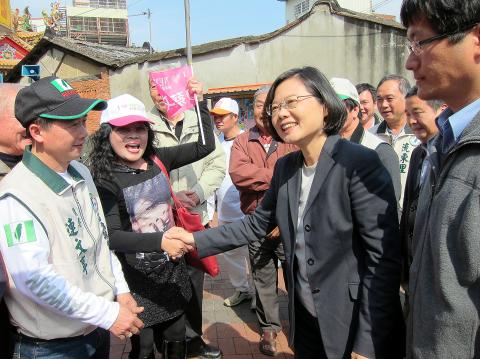The only thing standing in the way of phasing out the nuclear industry is “a lack of willpower,” Democratic Progressive Party (DPP) presidential nominee hopeful Tsai Ing-wen (蔡英文) said yesterday as she continued her weeklong critique of nuclear power.
“We have many alternative plans that I’m sure can be achieved with the right amount of hard work,” Tsai said, speaking on her “2025 nuclear-free homeland” plan for a fifth day.
“The problem is that the government is too reliant on the nuclear industry. It needs to change this attitude,” she said. “We would have 13 years left [before 2025] and I’m sure things can [be different by then].”

Photo: Ho Tsung-han, Taipei Times
Citing the dangers of nuclear power after the radiation leaks at Japan’s Fukushima Dai-ichi nuclear power plant, Tsai has proposed phasing out the industry when the operating license of the Ma-anshan Nuclear Power Plant in Pingtung County, the youngest operating facility, comes up for review in 2025.
She has also said she would seek to ensure that the Fourth Nuclear Power Plant, also known as the Longmen plant, currently under construction in Gongliao District (貢寮), New Taipei City (新北市), doesn’t become operational, pending whether the nation can increase other energy sources in time, such as through building renewable energy capacity and increasing efficiency at coal-fired power plants.
The government, as well as Chinese Nationalist Party (KMT) lawmakers, have rallied against Tsai’s proposal, saying it would waste the hundreds of billions of NT dollars already spent on the project and dramatically cut the nation’s reserve power ratio.
Tsai said such comments represented “a lack of willpower.”
“We hope to increase the ratio of renewable energy to 12 percent. The Ministry of Economic Affairs itself has set a target of 8 percent. We think that adding just 4 more percent ... is feasible,” she said.
Meanwhile, DPP lawmakers raised more questions about the safety of Taiwan’s nuclear plants by pointing to incident reports obtained from the nuclear regulatory agency.
Documents from the Atomic Energy Council show there were 15 safety violations between 2009 and this year at the three operating plants. The Longmen plant, despite it being not operational, recorded 18 incidents
during the same period.

The first global hotel Keys Selection by the Michelin Guide includes four hotels in Taiwan, Michelin announced yesterday. All four received the “Michelin One Key,” indicating guests are to experience a “very special stay” at any of the locations as the establishments are “a true gem with personality. Service always goes the extra mile, and the hotel provides much more than others in its price range.” Of the four hotels, three are located in Taipei and one in Taichung. In Taipei, the One Key accolades were awarded to the Capella Taipei, Kimpton Da An Taipei and Mandarin Oriental Taipei. Capella Taipei was described by

The Taichung District Court yesterday confirmed its final ruling that the marriage between teenage heir Lai (賴) and a man surnamed Hsia (夏) was legally invalid, preventing Hsia from inheriting Lai’s NT$500 million (US$16.37 million) estate. The court confirmed that Hsia chose not to appeal the civil judgement after the court handed down its ruling in June, making the decision final. In the June ruling, the court said that Lai, 18, and Hsia, 26, showed “no mutual admiration before the marriage” and that their interactions were “distant and unfamiliar.” The judge concluded that the couple lacked the “true intention of

EVA Airways today confirmed the death of a flight attendant on Saturday upon their return to Taiwan and said an internal investigation has been launched, as criticism mounted over a social media post accusing the airline of failing to offer sufficient employee protections. According to the post, the flight attendant complained of feeling sick on board a flight, but was unable to take sick leave or access medical care. The crew member allegedly did not receive assistance from the chief purser, who failed to heed their requests for medical attention or call an ambulance once the flight landed, the post said. As sick

INDUSTRY: Beijing’s latest export measures go beyond targeting the US and would likely affect any country that uses Chinese rare earths or related tech, an academic said Taiwanese industries could face significant disruption from China’s newly tightened export controls on rare earth elements, as much of Taiwan’s supply indirectly depends on Chinese materials processed in Japan, a local expert said yesterday. Kristy Hsu (徐遵慈), director of the Taiwan ASEAN Studies Center at the Chung-Hua Institution for Economic Research, said that China’s latest export measures go far beyond targeting the US and would likely affect any country that uses Chinese rare earths or related technologies. With Japan and Southeast Asian countries among those expected to be hit, Taiwan could feel the impact through its reliance on Japanese-made semi-finished products and